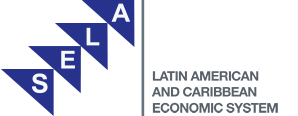BACKGROUND
The Public Policy Index for MSMEs in Latin America and the Caribbean (IPPALC) is a conceptual and methodological adaptation by the Permanent Secretariat of SELA of the Public Policy Index created and implemented since 2006 by the Organisation for Economic Cooperation and Development (OECD), in collaboration with the European Commission, the European Bank for Reconstruction and Development and the European Training Foundation.
The IPPALC is a tool designed to evaluate and monitor public policies aimed at encouraging the economic dynamism of MSMEs, thus enabling the evaluation of decision-making processes, ensuring the comparability of results among countries and facilitating the exchange of experiences in the field of public policies for MSMEs.
Since 2015, when the document Methodological considerations for developing an Index of Public Policies for SMEs in Latin America and the Caribbean was prepared and presented, the Permanent Secretariat has promoted the dissemination of this tool in order to promote its adoption and implementation in the region.
In this regard, and as a follow-up from the effort made in 2015, the Permanent Secretariat prepared in 2016 the document Update Study on the Public Policy Index for SMEs in Latin America and the Caribbean (IPPALC), which deals with the status of public policies for SMEs in the region and presents a detailed procedural framework for its implementation.
In July 2016, this study was presented during the Regional Meeting on the Update Study on the Public Policy Index for SMEs in Latin America and the Caribbean, held in San José, Costa Rica, with the co-sponsorship of the Ministry of Economy, Industry and Trade (MEIC). This event was attended by governmental focal points for SMEs of the Member States of SELA, as well as representatives of the OECD who expressed their interest in promoting the dissemination and implementation of the IPPALC in a joint effort with SELA.
In September 2016, the Workshop on implementation of the Index of Public Policies for SMEs in Latin America and the Caribbean was held in Panama City, Panama, with the collaboration of the OECD and the Authority for Micro, Small and Medium-sized Enterprises of Panama (AMPYME). The objectives of this activity focused on the dissemination of a standard methodology for the implementation of the IPPALC through practical exercises developed in the countries of the region; the promotion of the use of the tool, showing the benefits of its implementation in optimizing the decision-making process; and the identification of the countries that meet the requirements for its implementation and express their interest in adopting the indicator.
In May 2017, the Permanent Secretariat of SELA, in collaboration with the OECD and National Institute of the Entrepreneur (INADEM) of the Ministry of Economy of Mexico, organized the Workshop to launch the Public Policy Index for MSMEs in Latin America and the Caribbean (IPPALC): Pacific Alliance and South America. This event, held in Puerto Vallarta, Mexico, aimed to provide a space to share national views within the framework of the adoption of the IPPALC; optimize the procedural framework designed by the Permanent Secretariat for the successful implementation of the IPPALC; and review and validate the assessment questionnaires for each dimension of the IPPALC in accordance with the needs and characteristics of countries. The Member States of the Pacific Alliance (Peru, Mexico, Chile y Colombia), along with, Argentina, Ecuador and Uruguay, are currently implementing the IPPALC as part of their strategies to support MSMEs.
After this Workshop, the following key project milestones have taken place:
- Self-assessment: July-September 2017
- Independent assessment: October-December 2017
- National workshops in each participating country to review the preliminary results of these assessments: April-June 2018
Following these milestones, this regional validation workshop will be an opportunity to present the findings and aggregated results from all the country validation workshops, to calibrate the scores at regional level.










